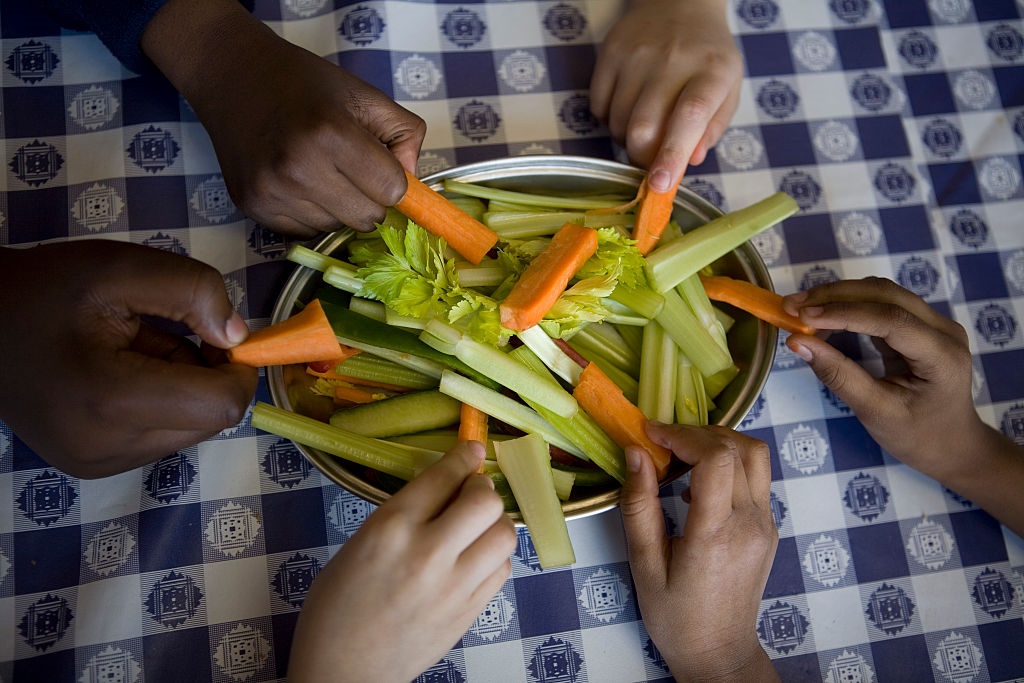


Health bodies have spoken out about government addressing nutrition.
Gideon Mendel/Corbis via Getty Images
- Health professionals want the government to address malnutrition in SA.
- The DIP, ADSA and NSSA say good nutrition is an essential part of an individual’s defence against diseases.
- Malnutrition is closely related to an increased risk of illness and deaths, the three bodies explain.
Three bodies representing dietitians and nutritionists in South Africa have called on the government to address malnutrition in all its forms as good nutrition is an essential part of an individual’s defence against disease.
“Malnutrition, in the forms of both over- and under-nutrition, is closely related to an increased risk of illness and death, which has a considerable economic and societal impact.
READ | Covid-19 and obesity: risks explained
“The coronavirus pandemic has emphasised the importance of food security and nutritional well-being for all South Africans and has exposed the vulnerability and weaknesses of our food systems,” the Association for Dietetics in South Africa (ADSA), the Nutrition Society of South Africa (NSSA) and Dietetics-Nutrition is a Profession (DIP) said in an open letter on Monday.
The three bodies added the nutrition challenges faced by South Africa were complex and underpinned by historical and current inequalities.
Poor nutrition
“Under-nutrition co-exists with the rising incidence of overweight and obesity [frequently in the same household] and resultant non-communicable diseases [NCDs] such as Type 2 diabetes mellitus and hypertension. The availability and affordability of highly processed foods are considered important drivers of poor nutrition.
“On the other hand, dietary patterns characterised by higher intakes of unprocessed foods are linked to more positive health outcomes,” they said.
According to the ASDA, DIP and NSSA, more than a quarter of the female adult population was overweight and more than a third obese, with the highest prevalence (42%) among urban women.
Premiers of the three provinces with the highest number of Covid-19 infections have all hinted at formally requesting the ban on the sale of liquor be re-instated as alcohol-related incidents are on the rise | @JasonFelix https://t.co/nJvLRByhTX
— News24 (@News24) June 15, 2020
In addition, it is estimated 269 000 NCD-related deaths occur in the country annually.
“Obesity and NCDs are regarded as major risk factors for Covid-19 hospital admissions and complications,” the bodies added.
They stated that while hunger had been reduced and food access in South Africa had improved over the past 15 years, 1.7 million households still experienced hunger in 2017, and “the pace of addressing inadequate food access has been too slow to achieve the goal of zero hunger by 2030”.
“Early indications now suggest a rapid rise in hunger prevalence since the lockdown was imposed, with up to 24% of residents not having money to buy food. In addition, in this context, food prices have increased by as much as 30% over the past two months, further adding to the financial strain on households.”
The bodies cited the UN which recognises the threat of the Covid-19 pandemic to food security and nutrition of millions of people.
The UN warns of a “looming global food emergency unless immediate co-ordinated action is taken”.
As a result, the three bodies, representing nutritionists and dietitians in South Africa, are calling on the government to:
- Prioritise nutrition on policy agendas related to health and social security, including a regulatory framework to support access to healthy and affordable foods.
- Provide strategic direction and ensure co-ordinated and aligned programming to address food and nutrition security, in collaboration with other sectors and civil society organisations.
- Co-ordinate an adequate and targeted food and social relief approach, prioritising the most vulnerable.
- Focus on delivery of preventive nutrition services as part of the transformation and strengthening of the health system, integrating nutrition into universal health coverage as an indispensable prerequisite for longer-term mitigation.
- Prioritise the challenges faced by specific populations, including the elderly, women, children and those with pre-existing medical conditions.
- Implement well-funded co-ordinated strategies to actively address the main drivers of malnutrition; paying attention to food, nutrition and health, backed up by responsive social protection mechanisms.
- Improve access to quality nutrition care through investment in human resources to increase the number of qualified nutrition professionals as well as education opportunities for other cadres of workers that provide nutrition services in primary care settings.
- Promote nutrition education of the public through targeted nutrition messaging and communication campaigns.

